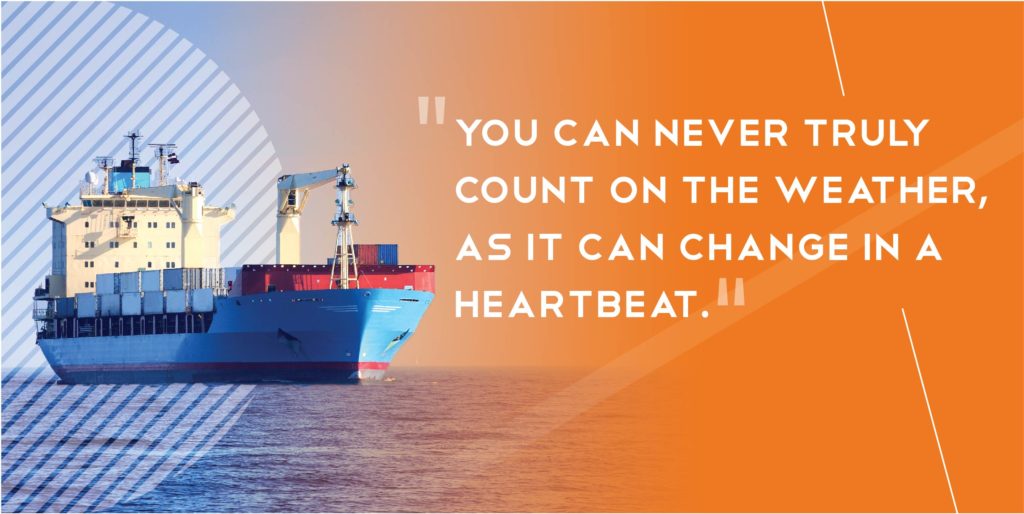We know, it’s the last thing anyone wants to deal with and something we all tend to underestimate – the weather. In the shipping industry, preparing for the weather is central to any logistical strategy. There must be a plan A (and plan B) for when weather takes a turn for the worse; here’s our take on dealing with unpredictable circumstances like these.
Experience is always best
Each origin, destination port or airport around the world experiences different weather-related disruptions to supply chains; primarily governed by the time of year and geography. When we enter a particularly risky season, historical experience allows TOC Logistics the chance to provide elevated attention via warning notices and direct conversation with planners and production teams. We deal with fog, snow and hurricanes in various regions and times of the year. We are able to plan the best route and provide realistic delivery times for clients by understanding weather patterns from a historical context and maintaining open lines of communication with production teams on the ground.
From a client perspective, production planners can serve their supply chains well by keeping a calendar of weather experiences from the past. This will assist in adjusting their releases and inventory levels during the brief historic periods where weather has caused disruptive delays. While predicting weather can be exercise in futility most of the time, protective measures are more successfully made by the clients themselves who have a solid understanding of their inventory and transit needs. By making production decisions based on past (and consistent) weather patterns, suppliers can save themselves time, money and headaches.
What happens when bad weather strikes
Depending on the consequences caused by the weather, TOC Logistics jumps into high gear to review and arrange diversions or terminations at unaffected port(s) where a vessel is scheduled to call. It should be stated that diversions are not always the best option, as they can have a lengthy approval process with the steamship lines. In general, once all options are reviewed, the time it takes to book an alternate route is just long enough that the weather delay is over and maintaining the original plan becomes the better decision.
If weather causes a delay that creates production-line inventory emergencies, then clients may have to ship supplemental quantities via air freight. Depending on where the inclement weather is affecting the supply chain, the choice of origin or destination airports becomes critical in meeting the timeline restrictions and avoiding a shut down. In times of emergency such as these, TOC is alongside the client, maintaining communication and assisting in any way we are able to secure the inventory and avoid production disruptions.
Rates are a different story and can increase as a result of bad weather. Sometimes vessels will bypass a port altogether, taking containers to an unintended destination. The cost of port termination and extended inland miles could double the price of the standard shipping mode. A bypassed port can accrue a backlog of outbound cargo. Rescheduling a vessel to safely arrive and recover the bypassed cargo could take up a week, sometimes longer. This is another reason route diversion can sometimes cause more bad than good.
Technology is our friend
All steamship lines have dispatch centers and control centers tuned into the weather for their assigned regions. These dispatch centers make most of the decisions on how vessels are directed during weather situations. Ultimately, the captains of the vessels have sole authority on maintaining the safety of the vessel and crew while in transit and rely on the information received from these dispatch centers. The newest and largest vessels have the latest weather technology to help them avoid storms at sea, but older vessels will also have their own weather radar. Technology aside, maintaining communication with the vessel operator’s main dispatch control is critical for the safety of the vessel, crew and cargo.
When bad weather hits TOC
Just as weather can impede the productivity of a supply chain, it can also impact our availability and responsiveness, especially if the incremental weather is on our doorstep. As a result, TOC Logistics has become nearly 100 percent paperless and applies a “flex” privilege strategy at our offices. Every employee is provided a laptop that allows them the opportunity to work from home when inclement weather is imminent or when family and/or medical circumstances cause a disruption in their professional life. Productivity is greatly enhanced in these situations because team members are not stuck in traffic or having to drive extended time to get to the office after short personal downtimes.
In the end, you can never truly count on the weather, as it can change in a heartbeat. What you can count on, is TOC Logistics to do our best in ensuring the safety and security of your cargo, and troubleshoot unpredictable weather alongside you every step of the way.

